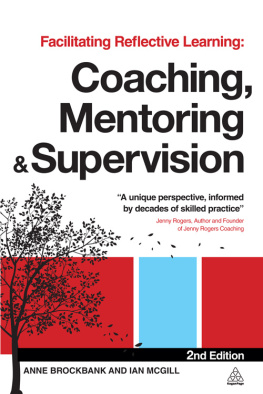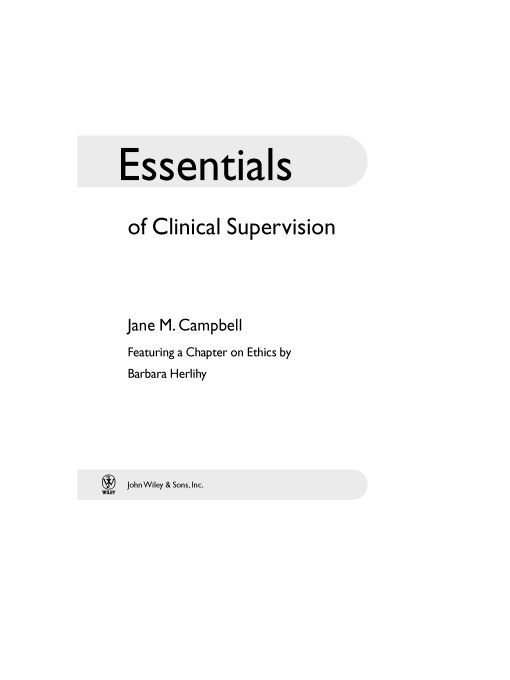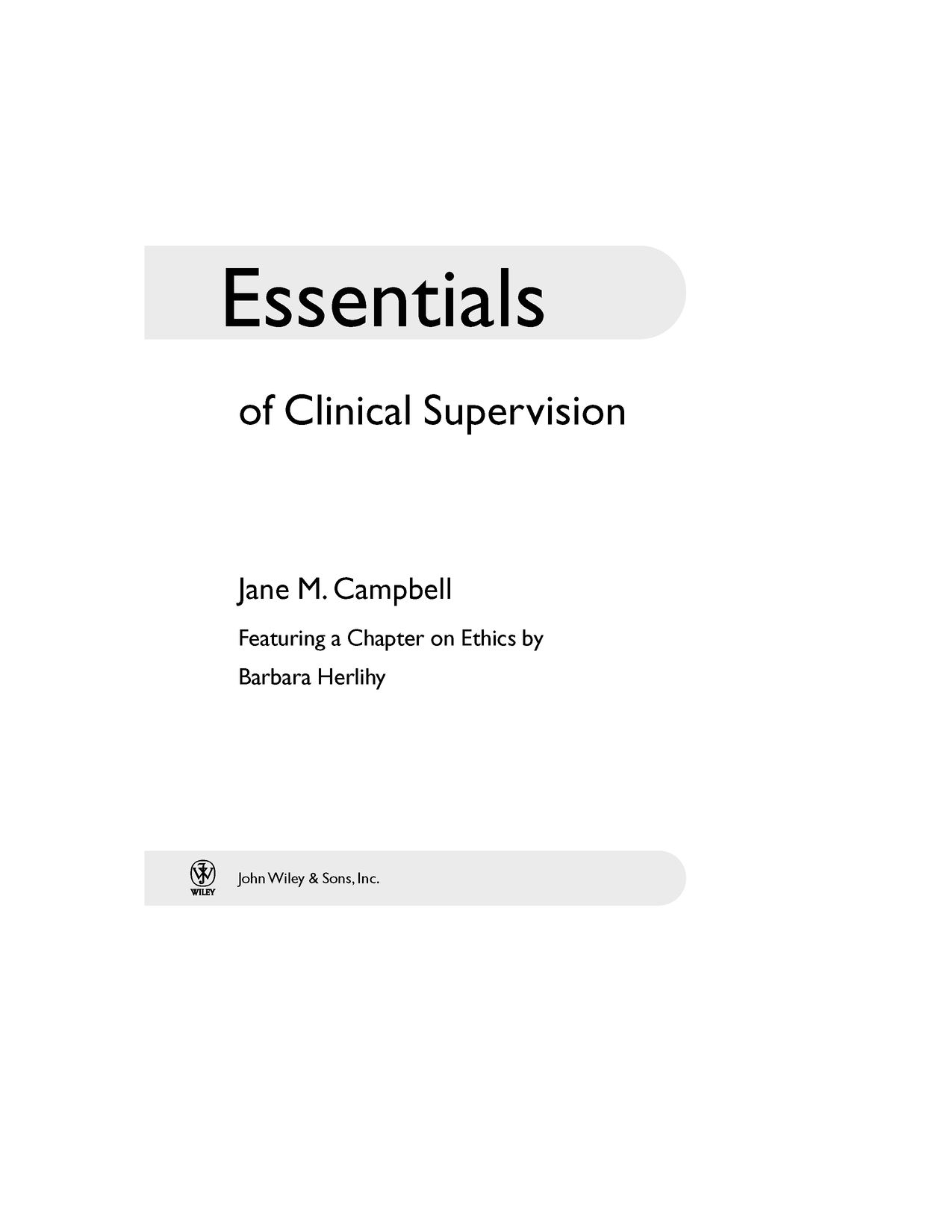Table of Contents
Essentials of Mental Health Practice Series
Founding Editors, Alan S. Kaufman and Nadeen L. Kaufman
Essentials of Interviewing
by Donald E. Wiger and Debra K. Huntley
Essentials of Outcome Assessment
by Benjamin M. Ogles, Michael J. Lambert, and Scott A. Fields
Essentials of Treatment Planning
by Mark E. Maruish
Essentials of Crisis Counseling and Intervention
by Donald E. Wiger and Kathy J. Harowski
Essentials of Group Therapy
by Virginia A. Brabender, Andrew I. Smolar, and April E. Fallon
Essentials of Clinical Supervision
by Jane M. Campbell
Dedication
This book is dedicated to all of the enthusiastic, involved, and committed clinical supervisors around the world who continue to do their best even in the most difficult and trying circumstances. The future of the mental and behavioral health professions is in your hands. Thank you.
Acknowledgments
Many of the case examples and Putting It Into Practice suggestions represent a compellation of ideas gathered from my supervision workshops and training offered across the United States these past 5 years. During these workshops, participants freely offered up creative and innovative ideas on how to solve day-today problems facing clinical supervisors everywhere and continuously validate the main premise of this book; it is the relationship supervisors build with supervisees that is core to effectiveness. I thank all of these nameless people who imparted their wisdom to me and to others in attendance at the workshops and wish to acknowledge their contributions to this book even if I am unable to thank them personally.
Jane M. Campbell
October 2005
SERIES PREFACE
In the Essentials of Mental Health Practice series, our goal is to provide readers with books that will deliver key practical information in an efficient and accessible style. The series features books on a variety of critical practice topics, such as interviewing, treatment planning, and outcomes assessment, to name a few. For the experienced professional, books in the series offer a concise yet thorough overview of a specific area of expertise, including numerous tips for best practices. Students will find here a prioritized assembly of all the information and techniques that must be at ones fingertips to practice knowledgeably, efficiently, and ethically in todays behavioral health environment.
Wherever feasible, visual cues highlighting key points are utilized alongside systematic, step-by-step guidelines. Chapters are focused and succinct. Topics are organized for an easy understanding of the essential material related to a particular practice area. Theory and research are continually woven into the fabric of each book, but always to enhance the practical application of the material, rather than to sidetrack or overwhelm readers. With this series, we aim to challenge and assist readers engaged in providing mental health services to aspire to the highest level of proficiency in their particular discipline by arming them with the tools they need for effective practice.
This text focuses on the basics of clinical supervision as both a training and a monitoring tool. Chapter 1 introduces the reader to the realities of clinical supervision in the twenty-first century and describes good and bad supervision practices. Chapter 2 explains the ethical and legal issues that are present in clinical supervision. Chapter 3 covers the current models for supervision and suggests a comprehensive model for practice. Chapters 4 and 5 go into detail about the major formats for delivery of supervision along with the most common methods and techniques. Chapter 6 stresses the importance of preparation in effective supervision and details for the reader how to set goals, plan best use of time, use proper documentation procedures, and structure evaluation in an ethical manner.
Chapters 7, 8, and 9 delineate the tasks, skills, and activities necessary at each stage of development of the supervisory relationship along with suggestions on how to solve some of the most common problems encountered by supervisors.
Alan S. Kaufman, PhD, and Nadeen L. Kaufman, EdD, Founding Editors
Yale University School of Medicine
One
INTRODUCTION TO CLINICAL SUPERVISION
Clinical supervision is an increasingly important area of specialization in the mental health field. It has become the primary means by which the entire allied health field is now taught (Getz, 1999; Neufeldt, 2003; Storm, Todd, Sprenkle, & Morgan, 2001). Extensive graduate course work is followed by mandatory hours, even years, of clinical supervision both within and outside a degree program. After graduation, most states require several thousand hours of supervised experience in order to become licensed for independent practice. In fact, for those specializing in substance abuse treatment, most professional training occurs through supervision of on-the-job experience, and not in the classroom. It is under the tutelage of an experienced practitioner that professionals, regardless of their discipline, learn the skills necessary to become competent, ethical, and effective helpers.
Additionally, clinical supervision is increasingly at the forefront of malpractice prevention. Agencies, hospitals, schools, and private practice settings are concerned about liability, and thus many are moving to mandatory clinical supervision for all employees regardless of level of education or years of experience in order to assure the highest standard of care possible for clients.
Yet even as clinical supervision grows in importance, specialized training in this area lags behind (Kaiser & Barretta-Herman, 1999; Saccuzzo, 2002; Scott, Ingram, Vitanza, & Smith, 2000). Most are promoted to supervisor because of excellent clinical skills and ability to do the work rather than because they have formal training in clinical supervision. Moreover, few receive ongoing training in supervision or supervision of supervision by practicing clinical supervisors (Baronchok and Kunkel, 1990; Page, Pietzak, & Sutton, 2001). Instead, most supervisors today rely mainly on their own background and experience as supervisees and utilize the same structure and methods their supervisors used with them (Campbell, 2001-2005). Though this is a rich tradition, there is a growing concern that supervisors are simply perpetuating the mistakes of their own supervisors and that clinical supervision as a specialization is floundering (Campbell, 2001-2005; Steven, Goodyear, & Robertson, 1998; Whiston & Coker, 2000 ; Worthington, 1987). Without any training, supervisors may be unprepared for the many changes and demands now being placed on them.
THE NATURE OF SUPERVISION
Why should clinical supervisors require specialized training? Shouldnt the fact that supervisors are usually highly successful and skilled practitioners automatically make them effective supervisors? The answer is no. Just because one is a skilled practitioner with clients does not necessarily mean one can be a good supervisor.
Supervision is a different relationship than counseling and therapy. Succinctly put, the primary purpose of clinical supervision is to review practitioners work to increase their skills and help them solve problems in order to provide clients the optimal quality of service possible and prevent any harm from occurring. Therefore, it is a teaching and training role as well as a monitoring function. Because the goal of supervision is to support ethical practice with clients, practitioners at all levels of education and experience can profit from supervision. The supervisory relationship may be voluntary (sought out) or involuntary (required by law), may extend over a definite period (as in the case of graduate internships or licensure), or be required indefinitely as part of employment. Always, however, the fundamental purpose of supervision remains the same.








